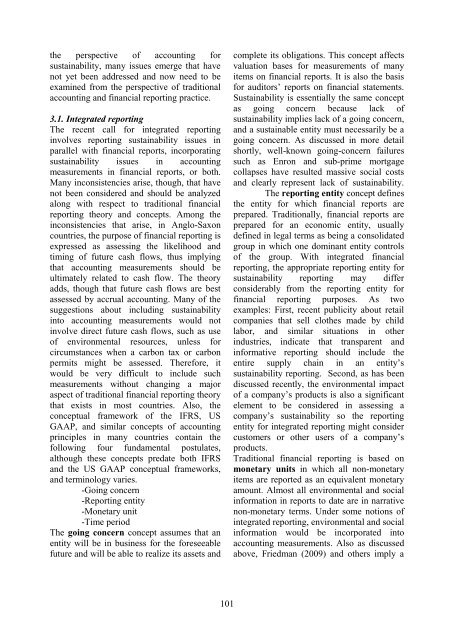Selected papers~ SPECIAL EDITION - Index of
Selected papers~ SPECIAL EDITION - Index of
Selected papers~ SPECIAL EDITION - Index of
Create successful ePaper yourself
Turn your PDF publications into a flip-book with our unique Google optimized e-Paper software.
the perspective <strong>of</strong> accounting for<br />
sustainability, many issues emerge that have<br />
not yet been addressed and now need to be<br />
examined from the perspective <strong>of</strong> traditional<br />
accounting and financial reporting practice.<br />
3.1. Integrated reporting<br />
The recent call for integrated reporting<br />
involves reporting sustainability issues in<br />
parallel with financial reports, incorporating<br />
sustainability issues in accounting<br />
measurements in financial reports, or both.<br />
Many inconsistencies arise, though, that have<br />
not been considered and should be analyzed<br />
along with respect to traditional financial<br />
reporting theory and concepts. Among the<br />
inconsistencies that arise, in Anglo-Saxon<br />
countries, the purpose <strong>of</strong> financial reporting is<br />
expressed as assessing the likelihood and<br />
timing <strong>of</strong> future cash flows, thus implying<br />
that accounting measurements should be<br />
ultimately related to cash flow. The theory<br />
adds, though that future cash flows are best<br />
assessed by accrual accounting. Many <strong>of</strong> the<br />
suggestions about including sustainability<br />
into accounting measurements would not<br />
involve direct future cash flows, such as use<br />
<strong>of</strong> environmental resources, unless for<br />
circumstances when a carbon tax or carbon<br />
permits might be assessed. Therefore, it<br />
would be very difficult to include such<br />
measurements without changing a major<br />
aspect <strong>of</strong> traditional financial reporting theory<br />
that exists in most countries. Also, the<br />
conceptual framework <strong>of</strong> the IFRS, US<br />
GAAP, and similar concepts <strong>of</strong> accounting<br />
principles in many countries contain the<br />
following four fundamental postulates,<br />
although these concepts predate both IFRS<br />
and the US GAAP conceptual frameworks,<br />
and terminology varies.<br />
-Going concern<br />
-Reporting entity<br />
-Monetary unit<br />
-Time period<br />
The going concern concept assumes that an<br />
entity will be in business for the foreseeable<br />
future and will be able to realize its assets and<br />
101<br />
complete its obligations. This concept affects<br />
valuation bases for measurements <strong>of</strong> many<br />
items on financial reports. It is also the basis<br />
for auditors’ reports on financial statements.<br />
Sustainability is essentially the same concept<br />
as going concern because lack <strong>of</strong><br />
sustainability implies lack <strong>of</strong> a going concern,<br />
and a sustainable entity must necessarily be a<br />
going concern. As discussed in more detail<br />
shortly, well-known going-concern failures<br />
such as Enron and sub-prime mortgage<br />
collapses have resulted massive social costs<br />
and clearly represent lack <strong>of</strong> sustainability.<br />
The reporting entity concept defines<br />
the entity for which financial reports are<br />
prepared. Traditionally, financial reports are<br />
prepared for an economic entity, usually<br />
defined in legal terms as being a consolidated<br />
group in which one dominant entity controls<br />
<strong>of</strong> the group. With integrated financial<br />
reporting, the appropriate reporting entity for<br />
sustainability reporting may differ<br />
considerably from the reporting entity for<br />
financial reporting purposes. As two<br />
examples: First, recent publicity about retail<br />
companies that sell clothes made by child<br />
labor, and similar situations in other<br />
industries, indicate that transparent and<br />
informative reporting should include the<br />
entire supply chain in an entity’s<br />
sustainability reporting. Second, as has been<br />
discussed recently, the environmental impact<br />
<strong>of</strong> a company’s products is also a significant<br />
element to be considered in assessing a<br />
company’s sustainability so the reporting<br />
entity for integrated reporting might consider<br />
customers or other users <strong>of</strong> a company’s<br />
products.<br />
Traditional financial reporting is based on<br />
monetary units in which all non-monetary<br />
items are reported as an equivalent monetary<br />
amount. Almost all environmental and social<br />
information in reports to date are in narrative<br />
non-monetary terms. Under some notions <strong>of</strong><br />
integrated reporting, environmental and social<br />
information would be incorporated into<br />
accounting measurements. Also as discussed<br />
above, Friedman (2009) and others imply a


